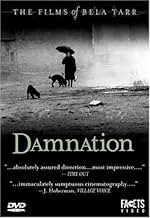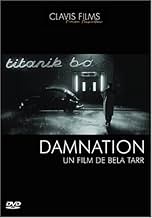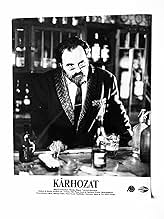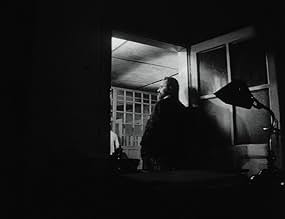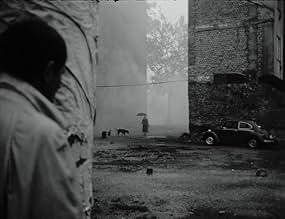Kárhozat
- 1988
- 2h
CALIFICACIÓN DE IMDb
7.6/10
7.2 k
TU CALIFICACIÓN
Agrega una trama en tu idiomaA lonely barfly falls in love with a married bar singer.A lonely barfly falls in love with a married bar singer.A lonely barfly falls in love with a married bar singer.
- Dirección
- Guionistas
- Elenco
- Premios
- 2 premios ganados y 1 nominación en total
- Dirección
- Guionistas
- Todo el elenco y el equipo
- Producción, taquilla y más en IMDbPro
Opiniones destacadas
An exceptionally brilliant movie. But this is not for everyone. Beautifully shot in black and white, the director bravely specialises in spectacularly lengthy shots which the viewer's brain will either become absorbed by or reject for tedium. An interesting dimension which can heighten involvement in these long shots (or annoy the hell out the unconvinced) is rhythmical sound - be it cranky machinery (like the relentless mechanical pulley system outside the 'central' character's window) or people dancing to cabaret music. There is a detachment to the camera-work, particularly in the dance band sequences, which reminded me of Kubrick. Again this is an approach which will alienate many viewers but it lends a kind of philosophical power what would otherwise be mundane documentary social observation.
I watched this after the more recent Werckmeister Harmonies on the current double-disc DVD edition available in the UK which is a superb issue and has an interview with the Director as a bonus feature. Interesting to note that he states quite categorically that he intends no allegorical/symbolic element to his work.
I watched this after the more recent Werckmeister Harmonies on the current double-disc DVD edition available in the UK which is a superb issue and has an interview with the Director as a bonus feature. Interesting to note that he states quite categorically that he intends no allegorical/symbolic element to his work.
Hey! Crazy movie! Oh Gaad it was so boring and depressing! Actually I felt quite privileged to have watched this film. Some people are NOT making films with the intention of being popular, and Bela Tarr is one of them. Satantango is 7 and a quarter hours long, and this one stretches an existential eternity across its 2 hours, bringing us 2 hours closer to death but hopefully nearer to life.
I was looking for symbolic significance from the first achingly long shot, but we were lucky enough to have Tarr interviewed in the cinema afterwards. He scuppered any suggestion of symbolism in his films, insisting that the fact of pointing a camera lens only at things that exist means that metaphysics and allegory are impossible in film. More than a hint of his totalitarian background in his didactic description of his work.
I felt like I had learned something from this film. I thought it showed how life in Hungary can be depressing, a struggle, apparently hopeless, but that the hopelessness only really comes from inside the person. A desperate, selfish man lurks around the drab industrial landscape, fixated on his one motivation, the woman who is his object of desire. He hatches a plan to get rid of her husband. Afterwards the director stated explicitly that the plot is deliberately simple and even banal - the main character delivers one monologue about how all stories dissipate and all heroes dissipate and die away. He stated that the dogs and the rain which both haunt the film are characters and have stories as much as the people.
If you get the chance, go and watch it. It's a proper work of art, there's nothing wrong with it!!!!!!!!!!!
I was looking for symbolic significance from the first achingly long shot, but we were lucky enough to have Tarr interviewed in the cinema afterwards. He scuppered any suggestion of symbolism in his films, insisting that the fact of pointing a camera lens only at things that exist means that metaphysics and allegory are impossible in film. More than a hint of his totalitarian background in his didactic description of his work.
I felt like I had learned something from this film. I thought it showed how life in Hungary can be depressing, a struggle, apparently hopeless, but that the hopelessness only really comes from inside the person. A desperate, selfish man lurks around the drab industrial landscape, fixated on his one motivation, the woman who is his object of desire. He hatches a plan to get rid of her husband. Afterwards the director stated explicitly that the plot is deliberately simple and even banal - the main character delivers one monologue about how all stories dissipate and all heroes dissipate and die away. He stated that the dogs and the rain which both haunt the film are characters and have stories as much as the people.
If you get the chance, go and watch it. It's a proper work of art, there's nothing wrong with it!!!!!!!!!!!
I watch Bela Tarr's films over again with endless fascination. The length is not a problem: No longer that many pieces of music. If you can concentrate through a Wagner opera and I hope you can, then a Tarr film is not very long. All the films are very much products of team work but lead by an autocratic man who knows exactly what he wants, hence the seam free quality of the experience, It is that, rather than the length which requires the concentration. I have not found it mentioned often enough but there is much humour in his films, Karrer does a reprise of Gene Kelly, which is then itself parodied near the end of the film. Damnation is maybe still my favourite, I suppose for the mesmerising way sound is used to structure a complex web of association, but then all of the available late films has so much to offer
The film that launched director Béla Tarr into international attention, Kárhozat is the Hungarian's first major investigation of the nature of humanity.
Trailing the exploits of alcoholic depressive Karrer, Kárhozat presents us with a view of a desolate and decrepit Hungarian town. He spends his days wandering from bar to bar, obsessing over a married lounge singer and part-time lover whom he longs to elope with. Passing off a job to collect a package to the husband, he buys himself three days alone with the object of his desires.
As is now his trademark, Tarr brings us the minimal number of shots: slow, winding, thoughtful and beautiful. His approach is simultaneously simple and complicated, showing us at the same time nothing and everything. The aesthetic of the film is astounding, beauty created wonderfully in the chaos and destruction of the landscape. The brooding intensity of the omnipresent coal trains dominates the work, an indicator of lost industry and decline. Miklós Székely leads the cast with the perfect stoic facade, his granite face holding back the weight of an emotional past and the crippling need for escape. The sinister and critical bartender gives us Karrer's true opinion of himself, one he would rather not face up to, whilst the sagacious old woman provides the film's sensibility and reason. The plot itself is not so important as the camera's journey and the character's silent ruminations, leading unavoidably to a wonderful climax and one which does exactly what it should: causes us to question our own lives and the oddity of humankind.
With beautiful, paced, unconventional direction, Tarr gives us an intimate portrait of ourselves and our world. Achieving an incredible amount with a minimalistic approach, the film is entrancing, mysterious, and inspiring. Telling us as much with his landscapes as with his characters, Tarr's Kárhozat is a testament to the brilliance of this creative juggernaut.
Trailing the exploits of alcoholic depressive Karrer, Kárhozat presents us with a view of a desolate and decrepit Hungarian town. He spends his days wandering from bar to bar, obsessing over a married lounge singer and part-time lover whom he longs to elope with. Passing off a job to collect a package to the husband, he buys himself three days alone with the object of his desires.
As is now his trademark, Tarr brings us the minimal number of shots: slow, winding, thoughtful and beautiful. His approach is simultaneously simple and complicated, showing us at the same time nothing and everything. The aesthetic of the film is astounding, beauty created wonderfully in the chaos and destruction of the landscape. The brooding intensity of the omnipresent coal trains dominates the work, an indicator of lost industry and decline. Miklós Székely leads the cast with the perfect stoic facade, his granite face holding back the weight of an emotional past and the crippling need for escape. The sinister and critical bartender gives us Karrer's true opinion of himself, one he would rather not face up to, whilst the sagacious old woman provides the film's sensibility and reason. The plot itself is not so important as the camera's journey and the character's silent ruminations, leading unavoidably to a wonderful climax and one which does exactly what it should: causes us to question our own lives and the oddity of humankind.
With beautiful, paced, unconventional direction, Tarr gives us an intimate portrait of ourselves and our world. Achieving an incredible amount with a minimalistic approach, the film is entrancing, mysterious, and inspiring. Telling us as much with his landscapes as with his characters, Tarr's Kárhozat is a testament to the brilliance of this creative juggernaut.
Okay, so my ongoing project is that I'm seeking out films where as you watch the self who sees comes into focus. The most clear and direct way is with slow filmmakers like Tarr and others, though it's a lost game if you let them simply numb you. Others like Greenaway, Lynch and Ruiz will do it by tricking you into invented realities, another boat down the same river.
Usually there's some impatience, a trying to figure things out, a disorientation is central among these filmmakers as the first step. As you quiet down that impatient self, and films of this sort help, things become clearer, unusual insights appear. But it also helps to see past the filmmaker, most of the time he imposes on his created world by trying to explain (usually through a surrogate self) some part of it, reducing.
Also clear, in this case it's the protagonist philosophizing on meaningless life, impossible salvation and the ruin of having to be, dreary stuff. Because he is the protagonist, we think some of it will shed some light. But that's just who Tarr is, gloomy, wondering. I don't doubt his sincere despair. But what's the use? Rest there and he'll suffocate you, stain you without cleansing.
Anyway, discard all that, and it can be a different experience. It's a worthy film beneath the mud.
It's a simple story, a schmuck is contracted to smuggle in a parcel, we can assume by the secrecy that it's some shady deal. In turn he contracts the husband of a woman he's having an affair with—a sexy torch singer. As the husband goes away, we go on to visit disconnected stops in this affair, this is what gives the film its dreamlike air. So that's the story.
More interesting is the world behind it. Your clue is a recurring visual motif introduced with just the first shot—a hazy view of something, and pan to reveal someone watching, an intermediate self between you and things. He IS constantly obscuring the view by thinking what it's about. The second time it's like in a film noir, it's raining, a man is watching a bar. Inside the bar, we are seduced by the femme fatale's smoky song, maybe it's all a nightmare as the lyrics say.
It's a wonderful scene that sets everything else up.
So as per noir rules, desire fools with the schmuck's sense of reality and we have the rest of the film as hazy perturbation. He has done something wrong and knows it, sending the husband away. The third time the watcher motif appears, the woman is not looking out to life through the blinds, but inside the room, her gaze cramped by walls of his desire —the scene plays out with sex, mirrored in a mirror reinforcing inversed reality.
So the affair grows stale—and lo, we have his endless monologues rationalizing frustration by directing it to the world, the world as punishment. And that as profundity that distracts.
So who is obscuring the view?
It's that intermediate self who instead of seeing, fidgets for more story and answers that preferably make some sense. It's your own self, fidgeting for more story when you watch a film like this.
Isn't this something that actually happens? As you watch these ultra slow films, which is why they can help, doesn't your own fidgety self distract you by aimless thinking? Isn't that self getting in the way of what is potentially there for you? Imagine if Tarr acknowledged the fact in his narration, for instance like Nabokov does with self-deprecating layered humor—it'd be an astounding film.
Tarr has set up other cool things, the husband knowing something is wrong as our guy's guilt, an older woman (his woman) suggesting peace in the dance together. But there are moments like when she quotes the Bible and the inane end with the dog, which muddle what it is about. Tarr was probably unsure himself, the interested part of him doing the noir abstraction, another part of him venting.
But the scene at the bar, her song as noir hallucination. The architecture and roaming camera as in Marienbad. And all of it submerged as different levels of watching. I'd like to think Lynch saw this, and immediately knew which parts worked. Tarr is probably still unsure.
Usually there's some impatience, a trying to figure things out, a disorientation is central among these filmmakers as the first step. As you quiet down that impatient self, and films of this sort help, things become clearer, unusual insights appear. But it also helps to see past the filmmaker, most of the time he imposes on his created world by trying to explain (usually through a surrogate self) some part of it, reducing.
Also clear, in this case it's the protagonist philosophizing on meaningless life, impossible salvation and the ruin of having to be, dreary stuff. Because he is the protagonist, we think some of it will shed some light. But that's just who Tarr is, gloomy, wondering. I don't doubt his sincere despair. But what's the use? Rest there and he'll suffocate you, stain you without cleansing.
Anyway, discard all that, and it can be a different experience. It's a worthy film beneath the mud.
It's a simple story, a schmuck is contracted to smuggle in a parcel, we can assume by the secrecy that it's some shady deal. In turn he contracts the husband of a woman he's having an affair with—a sexy torch singer. As the husband goes away, we go on to visit disconnected stops in this affair, this is what gives the film its dreamlike air. So that's the story.
More interesting is the world behind it. Your clue is a recurring visual motif introduced with just the first shot—a hazy view of something, and pan to reveal someone watching, an intermediate self between you and things. He IS constantly obscuring the view by thinking what it's about. The second time it's like in a film noir, it's raining, a man is watching a bar. Inside the bar, we are seduced by the femme fatale's smoky song, maybe it's all a nightmare as the lyrics say.
It's a wonderful scene that sets everything else up.
So as per noir rules, desire fools with the schmuck's sense of reality and we have the rest of the film as hazy perturbation. He has done something wrong and knows it, sending the husband away. The third time the watcher motif appears, the woman is not looking out to life through the blinds, but inside the room, her gaze cramped by walls of his desire —the scene plays out with sex, mirrored in a mirror reinforcing inversed reality.
So the affair grows stale—and lo, we have his endless monologues rationalizing frustration by directing it to the world, the world as punishment. And that as profundity that distracts.
So who is obscuring the view?
It's that intermediate self who instead of seeing, fidgets for more story and answers that preferably make some sense. It's your own self, fidgeting for more story when you watch a film like this.
Isn't this something that actually happens? As you watch these ultra slow films, which is why they can help, doesn't your own fidgety self distract you by aimless thinking? Isn't that self getting in the way of what is potentially there for you? Imagine if Tarr acknowledged the fact in his narration, for instance like Nabokov does with self-deprecating layered humor—it'd be an astounding film.
Tarr has set up other cool things, the husband knowing something is wrong as our guy's guilt, an older woman (his woman) suggesting peace in the dance together. But there are moments like when she quotes the Bible and the inane end with the dog, which muddle what it is about. Tarr was probably unsure himself, the interested part of him doing the noir abstraction, another part of him venting.
But the scene at the bar, her song as noir hallucination. The architecture and roaming camera as in Marienbad. And all of it submerged as different levels of watching. I'd like to think Lynch saw this, and immediately knew which parts worked. Tarr is probably still unsure.
¿Sabías que…?
- TriviaWith "Kárhozat / Damnation", the first of his collaborations with novelist Laszlo Krasznahorkai, Bela Tarr adopts a formally rigorous style, featuring long takes and slow tracking shots of the bleak landscape that surrounds the characters.
- ErroresIn the Dance/Party scene, the band and the music are clearly out of sync.
- Citas
The Singer: I like the rain. I like to watch the water run down the window. It calms me down. I don't think about anything. I just watch the rain.
- ConexionesEdited into Gli ultimi giorni dell'umanità (2022)
Selecciones populares
Inicia sesión para calificar y agrega a la lista de videos para obtener recomendaciones personalizadas
- How long is Damnation?Con tecnología de Alexa
Detalles
- Tiempo de ejecución
- 2h(120 min)
- Color
- Mezcla de sonido
- Relación de aspecto
- 1.66 : 1
Contribuir a esta página
Sugiere una edición o agrega el contenido que falta



